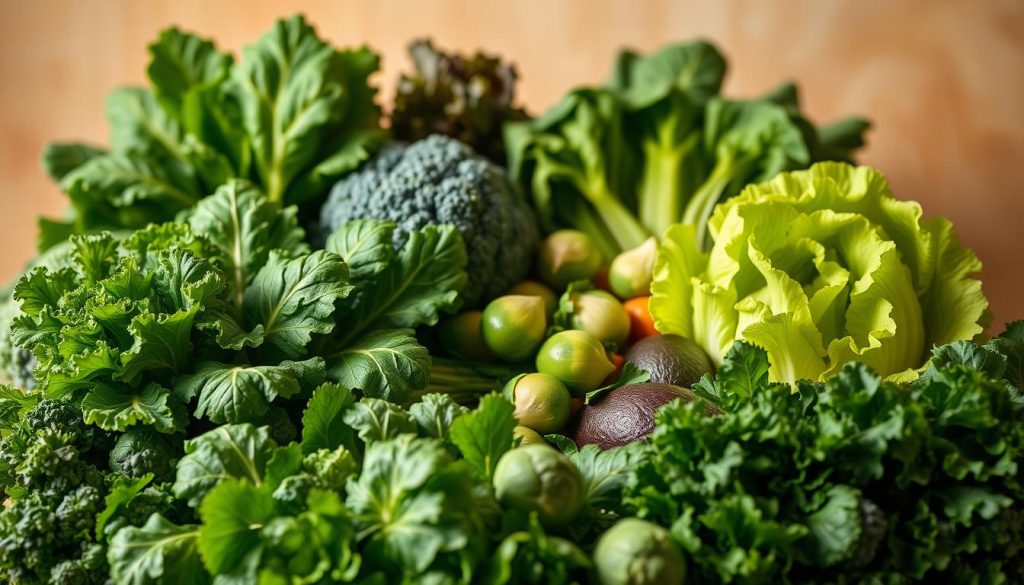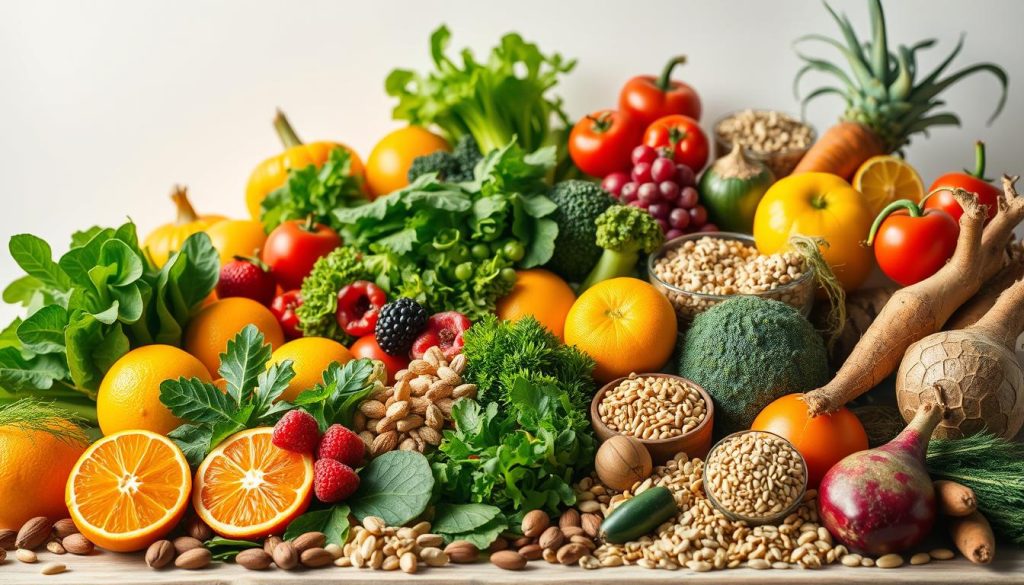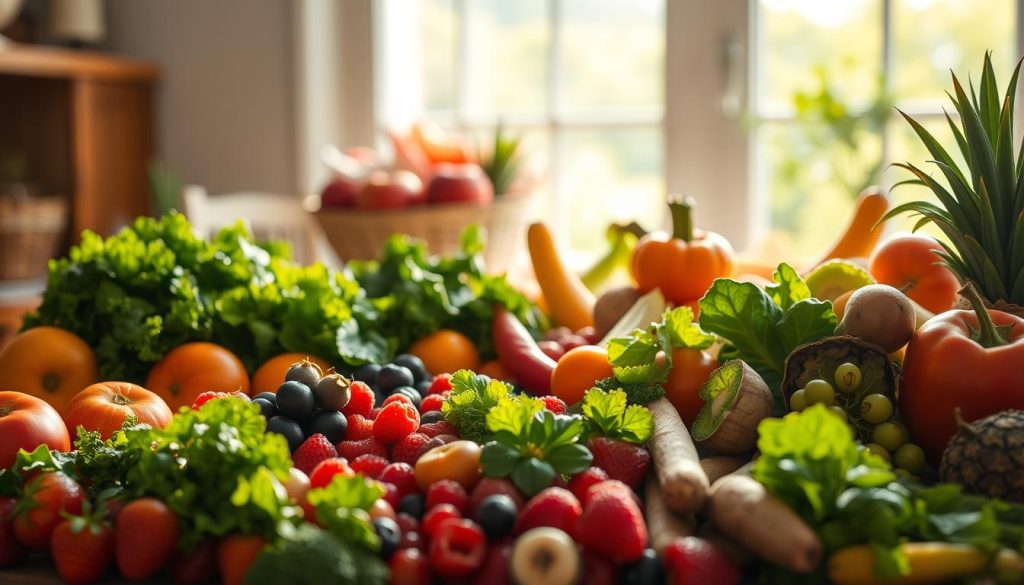In this guide, we’ll dive into the amazing world of vitamin-rich foods. These foods are key to keeping our bodies healthy. They make eating a journey to better health.
We’ll look at foods like berries and leafy greens. These foods are full of antioxidants and nutrients. They help boost our well-being. Every time we shop or cook, we can choose foods that are good for us.
Key Takeaways
- Vitamin-rich ingredients like berries and greens are vital for sustained energy and immunity.
- Healthy nutrients found in whole foods support both short-term wellness and long-term health goals.
- Choosing nutrient-dense options can turn ordinary meals into powerful sources of nourishment.
- Nature’s colorful produce offers a variety of vitamins without sacrificing taste or enjoyment.
- Understanding these ingredients helps create a diet that balances taste and nutritional excellence.
Understanding the Power of Nutrition in Our Daily Lives
Every bite we take shapes how we feel and function. Essential vitamins and nutrients are our silent partners in every heartbeat, thought, and movement. From morning to night, the foods we choose fuel—or deplete—our daily lives.
Modern life often pushes us toward quick fixes like supplements or fortified snacks. But our bodies evolved to thrive on whole foods, not just nutritional additives. Nature’s design ensures nutrients in their natural forms work together, boosting absorption and impact.
For example, vitamin C in oranges boosts iron uptake, a synergy lost when isolated in pills.
- Essential vitamins in whole foods work with fiber, enzymes, and other compounds to maximize health benefits.
- Nutritional additives often lack this balanced profile, making their benefits less consistent.
- Studies show natural sources improve long-term wellness compared to synthetic alternatives.
Nutrients work best when delivered as nature intended—never in isolation.
Choosing nutrient-dense meals isn’t just a trend—it’s a return to basics. Every meal is a chance to support immunity, focus, and vitality. Let’s rethink convenience and embrace foods that nourish from the inside out.
Why Your Body Craves Vitamin-Rich Foods
Our bodies naturally look for nutrients to stay healthy. Cravings are not random. They are signs of beneficial vitamins and minerals our bodies need. By listening to these signals, we follow nature’s plan for health.
Boosting Immunity Through Natural Sources
When we feel a cold coming, our body wants citrus and leafy greens. These foods are full of vitamin C and zinc. They help our immune system more than any pill can.
- Vitamin C in oranges boosts white blood cells.
- Zinc in spinach helps fight off infections.
- Vitamin D in mushrooms keeps our immune system in balance.
Energy Production and Vitamin Synergy
“Vitamins work in networks, not isolation,” says Dr. Emily Chen, a nutritional scientist. “B vitamins and magnesium convert food into energy like a well-oiled machine.”
Whole grains (B vitamins) and almonds (magnesium) together give us energy. This energy boost is better than any single natural supplement.
Long-Term Health Benefits of Consistent Nutrition
| Benefit | Key Nutrients | Food Sources |
|---|---|---|
| Heart health | Vitamin E, potassium | Avocados, bananas |
| Cognitive function | Vitamins B6, B12 | Salmon, chickpeas |
| Skin vitality | Vitamin A, C | Carrots, bell peppers |
Eating foods rich in beneficial vitamins regularly helps our heart, brain, and skin. It also lowers the risk of chronic diseases over time.
Colorful Fruits: Nature’s Vitamin Packages
Nature’s colorful fruits are more than tasty—they’re full of vitamin-rich ingredients and antioxidant-rich ingredients. Each color means a nutrient boost is waiting for you. Let’s see how these natural wonders help protect and nourish us.
Berries: Small Fruits with Mighty Antioxidant Properties
Berries like blueberries and strawberries are full of antioxidants. Their deep colors have compounds that fight oxidative stress. This protects cells from harm. Eating a handful of berries a day gives you a vitamin C and anthocyanin boost. They help keep you healthy and full of energy. Try adding them to smoothies or yogurt for a quick nutrient boost.
Tropical Treasures: Exotic Fruits and Their Unique Vitamin Profiles
Exotic fruits like dragon fruit and mangoes add tropical flavor to your meals. Dragon fruit has vitamin C and B vitamins, while papaya has enzymes for better digestion. These vitamin-rich ingredients are rare but vital for filling nutritional gaps. Add them to salads or salsas for a bold flavor and health upgrade.
Stone Fruits: Seasonal Delights for Optimal Health
Stone fruits like peaches and cherries are sweet and full of fiber and micronutrients. Their juicy flesh is packed with vitamins A and C, and fiber helps digestion. Enjoy them fresh or baked for a natural energy boost. Seasonal fruits are at their best, so shop local and in-season for the most nutrients.
Green Giants: Leafy Vegetables That Transform Your Health
Leafy greens are packed with vitamins, minerals, and antioxidants. They include kale and spinach, which are good for bones and brain. Imagine eating a salad that’s like a multivitamin.

“Chlorophyll isn’t just what makes plants green—it’s a cellular cleanser that boosts oxygenation and detoxification.”
Kale is great for bones, spinach is full of iron, and Swiss chard boosts your immune system. Even weeds like dandelion greens are good for your liver. Each leaf has its own special vitamins for your body.
- Blend them: Add spinach to smoothies for a tasty boost.
- Roast them: Bake kale in olive oil for crispy, vitamin A-rich snacks.
- Layer them: Use lettuce leaves as wraps for protein-packed meals.
Bitter greens like arugula and mustard greens are tasty with citrus or garlic. Make leafy greens a regular part of your diet. Your body will get more energy and stay healthy.
Nuts, Seeds, and Legumes: Tiny Powerhouses of Nutrition
Every journey to better health starts with small steps—and tiny foods can make a big difference. Nuts, seeds, and legumes are superfood ingredients that pack a punch in every bite. These nutrient-dense foods offer brain support, protein, and essential vitamins in compact forms. Let’s explore how these natural powerhouses can transform your diet.
Omega-Rich Seeds for Brain Health
Flaxseeds, chia, and hemp seeds are cognitive boosters. Their omega-3 fatty acids support brain function and may slow age-related decline. Here’s their impact:
| Seed Type | Key Benefits |
|---|---|
| Flaxseeds | Rich in ALA omega-3s for neural health |
| Chia Seeds | High in fiber and calcium for balanced energy |
| Hemp Seeds | Complete protein profile with magnesium and zinc |
Protein-Packed Legumes with Vitamin Benefits
Legumes like lentils and chickpeas deliver protein without the animal product reliance. Try these powerhouses:
- Lentils: 18g protein/cup + iron for energy
- Chickpeas: Folate-rich for cell repair
- Black beans: Vitamin B6 for immune support
Daily Nut Consumption: How Much Is Ideal?
Start with ¼ cup of nuts daily—walnuts, almonds, or pistachios. Pair with legumes for balanced meals. Soak nuts overnight to boost digestibility, and sprout seeds to unlock enzymes. Your body absorbs nutrients better this way!
These tiny allies make nutrition simple. Add chia to oatmeal, toss roasted chickpeas as snacks, or sprinkle hemp on salads. Every bite is a step toward vitality.
The Most Vitamin-Rich Ingredients You Should Know
Discover the power of essential vitamins with these top vitamin-rich ingredients. Nature’s best offer a lot of nutrition in small amounts. Here are the key ingredients to add to your diet for better health.

| Ingredient | Key Vitamins | Why It Matters |
|---|---|---|
| Beef Liver | Vitamin A, B12 | Supplies 500%+ daily vitamin A needs in one serving. |
| Bell Peppers | Vitamin C | 2x more vitamin C than oranges; best raw or lightly cooked. |
| Salmon | Vitamin D | One fillet provides 100% of daily vitamin D—critical for bone health. |
| Egg Yolks | Vitamin D | Underrated source of vitamin D, in pasture-raised eggs. |
| Moringa | A, C, Iron | Leaf powder boosts immunity and energy in smoothies. |
| Camu Camu | Vitamin C | Brazilian superberry has 30x more C than oranges. |
| Sea Buckthorn | C, E, Beta-Carotene | Berries in jams support skin health and immunity. |
Use these ingredients wisely: mix camu camu powder with yogurt, cook liver with bell peppers, or add sea buckthorn berries to salads. Adding these to your meals ensures you get the essential vitamins often lacking in regular diets. Make these nutritional powerhouses a regular part of your kitchen!
Preserving Nutrient Integrity: From Market to Table
Getting the most out of your meals starts with how you handle food after buying it. Small actions, like how you store or cook food, affect the nutrients you get. Let’s look at ways to keep your food healthy.
Storage Techniques That Maintain Vitamin Content
Keeping produce right helps prevent nutrient loss. Fruits like apples and bananas, which give off ethylene gas, should be kept away from ethylene-sensitive items like leafy greens. Here’s how to do it right:
- Refrigerate leafy greens in breathable containers.
- Use airtight bags for cut vegetables to retain moisture.
- Freeze berries within 24 hours of purchase to lock in antioxidants.
Cooking Methods That Enhance Instead of Destroy
Not all heat is bad. Some cooking methods can actually help your body absorb more nutrients:
- Steaming vegetables like broccoli preserves water-soluble vitamins (C and B) better than boiling.
- Light stir-frying with olive oil enhances carotenoids in carrots and spinach.
- Roasting tomatoes increases lycopene availability by 35%.
“Cooking isn’t about loss—it’s about unlocking the full nutritional value.” – Nutritional Science Journal
When Raw Is Best: Foods to Enjoy Uncooked
| Food | Why Raw? | Key Benefits |
|---|---|---|
| Spinach | Loses folate when heated | Raw boosts iron absorption |
| Broccoli | Retains sulforaphane enzymes | Supports detoxification pathways |
| Garlic | Allicin (antioxidant) degrades with heat | Chop garlic 10 minutes before use to activate enzymes |
Use these tips and natural supplements only when you can’t get enough from whole foods. Every step, from buying to eating, affects your nutrient intake. Small changes can make a big difference in your health over time.
Creating Your Personal Nutrition Blueprint
Your journey to optimal health starts with understanding that one diet doesn’t fit all. Every body has unique needs shaped by genetics, gut health, and daily activity levels. We invite you to craft a plan that aligns with your lifestyle, using the healthy nutrients found in nature and science-backed nutritional additives.
- Assess your bioindividuality: Track energy dips or cravings to identify gaps in your diet.
- Embrace seasonal eating: Follow nature’s rhythm—spring greens, summer berries, and winter squash—to maximize nutrient variety.
- Adapt to restrictions: For gluten-free or vegan diets, explore fortified grains or algae-based supplements as safe nutritional additives.
Supplements aren’t a replacement for whole foods but a bridge when needed. For example, vitamin D-fortified plant milks or omega-3 capsules can support deficiencies without compromising dietary choices.
“Nutrition is a language your body speaks daily. Listen closely.” – Nutrition Today, 2023
Track progress beyond calories. Notice improvements in sleep, skin clarity, or sustained energy. Adjust your blueprint quarterly, just as seasons change. Tools like food journals or apps like MyFitnessPal simplify this process, giving insights into micronutrient intake.
Start small. Swap one processed snack for a handful of walnuts. Add a leafy green salad to your lunch. Every choice builds a blueprint that nourishes your unique biology. Let’s create a plan that celebrates your body’s needs, not limits.
Conclusion: Embracing a Life Enhanced by Nature’s Best Offerings
Superfoods and antioxidants show us how nature can boost our health and happiness. These foods are more than just nutrients; they fuel our energy and connect us. Think of every meal as a step towards a brighter, more vibrant life.
Start with small changes. Try swapping a snack for superfoods like almonds or dark greens. Choose foods rich in antioxidants, like berries or turmeric, every day. Every choice, from how you store to how you cook, keeps your food fresh and full of flavor.
Science and tradition meet in the world of superfoods. Ancient diets prove that eating well is timeless. Mixing avocado with spinach or roasting veggies boosts flavor and honors tradition. This way, we create meals that are both joyful and meaningful.
Let’s see meals as adventures. A spinach salad is more than greens; it’s a mix of vitamins and culture. Eating nuts is a celebration of health and heritage. With every mindful choice, superfoods and antioxidants become part of your wellness journey.
Together, we’re building a future where eating well means enjoying life. Start today by adding berries to your yogurt or spinach to your smoothie. Let’s cherish nature’s gifts, one vibrant ingredient at a time. Our bodies and the planet will flourish.


